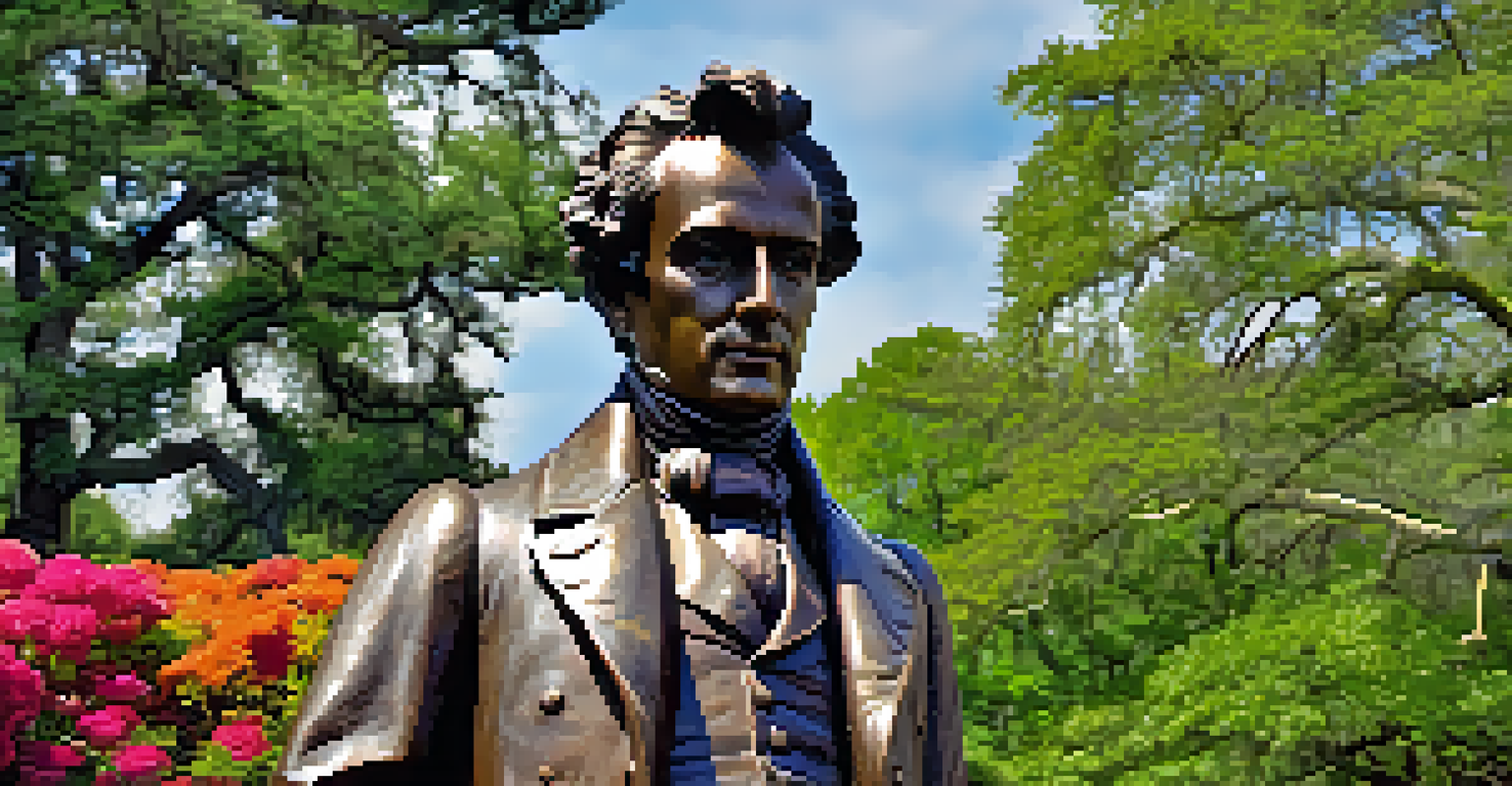Stephen F. Austin: The Father of Texas and His Legacy in Austin

Who Was Stephen F. Austin and Why Is He Important?
Stephen F. Austin, often referred to as the 'Father of Texas,' played a pivotal role in the early history of the state. Born in Virginia in 1793, he moved to Texas to fulfill his father's vision of establishing a colony. Austin's leadership and vision transformed Texas from a sparsely populated region into a thriving community of settlers, laying the groundwork for the state's future.
Texas will again lift its head and stand among the nations.
Austin wasn't just a colonizer; he was a diplomat and a politician. His ability to negotiate with both the Mexican government and American settlers was essential in the early 19th century. He advocated for the rights of settlers, balancing their needs while maintaining relations with Mexican authorities, which was no easy feat during a time of tension.
Ultimately, Austin's efforts and commitment to the development of Texas earned him a place in history. His legacy is not just in the land he settled, but in the very ethos of Texas as a land of opportunity and resilience, a theme that resonates to this day.
Austin's Journey to Establish a Texas Colony
In 1821, Stephen F. Austin received a land grant from the Spanish government, allowing him to bring settlers to Texas. This was a monumental moment, as it marked the beginning of organized American colonization in the region. Austin meticulously planned his colony, emphasizing agriculture and community living, which attracted many families looking for new opportunities.

Austin's journey wasn't without challenges. He faced obstacles like resistance from Native American tribes and the complexities of navigating Mexican laws. However, his determination and diplomatic skills helped him overcome these hurdles, enabling him to establish the first successful Anglo-American settlement in Texas, known as San Felipe de Austin.
Austin: Father of Texas
Stephen F. Austin was instrumental in establishing Texas as a thriving community, earning him the title 'Father of Texas.'
This settlement became a blueprint for future communities in Texas, influencing how settlers would organize and interact with each other. Austin's vision for a prosperous colony laid the foundation for what would eventually grow into a vibrant state.
The Role of Stephen F. Austin in Texas Independence
As tensions escalated between Texas settlers and the Mexican government, Stephen F. Austin emerged as a key figure in the push for independence. Initially, he sought peaceful solutions, advocating for the rights of Texans. However, as negotiations failed, he recognized the need for a more assertive stance against Mexican rule.
No man is entitled to the blessings of freedom unless he is vigilant in its preservation.
Austin's leadership was crucial during the early days of the Texas Revolution. He was appointed as a commissioner to the United States, where he sought support for the Texan cause. His charisma and persuasive abilities garnered attention, helping to rally support from American sympathizers who believed in the Texan struggle for freedom.
When the revolution began in earnest, Austin took on the role of a military leader. His commitment to the cause and strategic thinking were instrumental in the early victories that ultimately led to Texas gaining independence in 1836.
The Founding of Austin, Texas: A City Named in His Honor
In 1839, the Republic of Texas officially designated a new capital city, naming it Austin in honor of Stephen F. Austin. The choice was significant, reflecting Austin's contributions and vision for the region. The city was strategically located along the Colorado River, making it a vital center for trade and governance.
Austin's influence is evident in the city's layout and planning, which emphasized open spaces and community interaction. He envisioned a city that would be a hub for culture, politics, and education, which has largely been realized over the years. Today, Austin is known for its vibrant arts scene and innovative spirit.
Key Role in Texas Independence
Austin's leadership and diplomatic efforts were crucial during the Texas Revolution, ultimately leading to the state's independence in 1836.
The establishment of Austin as a capital also marked a turning point in Texas history. It symbolized the transition from a collection of settlements to a unified state, further solidifying Austin's legacy as a foundational figure in Texas history.
Austin's Legacy in Modern Texas Culture
Stephen F. Austin's legacy is woven into the very fabric of Texas culture. His vision for a community-oriented and prosperous state resonates in the values held by many Texans today. Concepts like independence, resilience, and the pursuit of opportunity can all be traced back to Austin's pioneering spirit.
Modern Austin, with its reputation for innovation and creativity, embodies many of the ideals that Austin promoted. The city is a hub for technology and culture, attracting diverse populations and fostering a unique identity. This dynamic atmosphere reflects the forward-thinking mindset that Austin championed.
Moreover, events like the annual Texas Independence Day celebrations honor Austin's contributions and remind Texans of their rich heritage. His legacy serves as a source of inspiration, encouraging future generations to uphold the principles of hard work and community spirit.
The Historical Significance of Austin's Contributions
Austin's contributions go beyond his own lifetime; they have shaped the historical narrative of Texas. By establishing a colony and advocating for settlers, he played a critical role in the state's development and identity. His efforts not only impacted Texas but also influenced the broader American narrative of westward expansion.
The legal and political frameworks that Austin helped establish laid the groundwork for the governance of Texas. His involvement in the early legislative processes shaped policies that would guide the state for years to come. This foundational work is still relevant in discussions about Texas's governance and rights.
Legacy in Modern Texas Culture
Austin's vision for a community-oriented and prosperous state continues to resonate in the values and identity of modern Texas.
Additionally, Austin's legacy is a reminder of the complexities of American history. While he is celebrated for his contributions, the interactions with Native American tribes and the implications of colonization present a nuanced perspective that is essential for understanding Texas's past.
Remembering Stephen F. Austin: Monuments and Memorials
Today, Stephen F. Austin is commemorated in various ways throughout Texas. Statues, parks, and schools bear his name, serving as reminders of his significant role in the state's history. These monuments provide opportunities for education and reflection on the values he embodied.
One notable memorial is the Stephen F. Austin State University in Nacogdoches, which reflects his commitment to education and community development. The university continues to inspire new generations of Texans, aligning with Austin’s vision for a prosperous and educated populace.

These tributes not only honor Austin's legacy but also encourage ongoing conversations about the complexities of Texas's history. By remembering figures like Austin, we can appreciate the rich tapestry of stories that have shaped the Lone Star State.